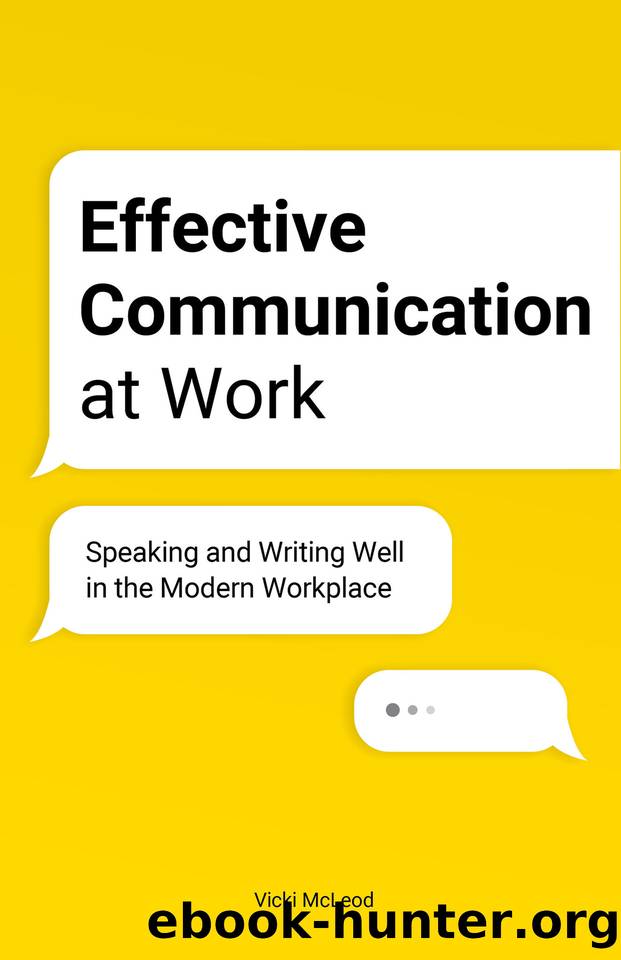Effective Communication at Work: Speaking and Writing Well in the Modern Workplace by McLeod Vicki

Author:McLeod, Vicki [McLeod, Vicki]
Language: eng
Format: epub
Publisher: Rockridge Press
Published: 2020-06-01T16:00:00+00:00
PART 2
Better Work Relationships
CHAPTER 5
AWARENESS OF SELF AND OTHERS
S elf-awareness is inner work, but it is well worth embracing if you want to succeed in the workplace. In 2019, the American Management Association (AMA) reported on a study conducted by the organizational consulting firm Green Peak Partners. The study, titled “What Predicts Executive Success,” found that a high self-awareness score was the strongest predictor of overall success for executives.
The study goes on to say that “an executive who is self-aware and good with staff will be better at working with clients and business partners, better at grasping and executing strategy, and better at delivering bottom-line results. These mostly lower-ego, trust-inspiring executives still hold the bar very high and demand strong performance but with a style that incorporates strong relational skills and respect.”
The words lower-ego and trust-inspiring are the cornerstones for using awareness to build meaningful connections with colleagues, coworkers, and staff. Even if you’re not an executive today, there is no doubt that if you are reading this book you are engaging in interpersonal relationships at work. If you hope to advance in your career, increasing your self-awareness by managing your ego and building trust will be critical.
Awareness allows us to tune in to what is happening in our inner dialogue as well as what is happening in the environment around us. This provides us with a higher level of social awareness as well as an emotional literacy whereby we can identify and process our own emotional states and empathize with others’ emotional states. Crucial to effective communication in and out of the workplace, awareness of self and others is a core leadership quality.
Self-aware people have developed a sophisticated sense of their own emotional range, take responsibility for their actions and impact, are clear about boundaries, and can self-manage in difficult situations. This helps us tolerate workplace frustrations and navigate conflict, reduces stress, and makes us less impulsive and argumentative. As our awareness expands, we are able to put aside self-centeredness and see and understand others’ perspectives. We become more naturally curious and open-minded. This leads to empathy, allowing us to see past differences and find common ground—which is more important than ever given the diverse, global nature of most workplaces.
Being Aware of Yourself
Sir John Whitmore, a founder of the contemporary executive coaching movement and author of Coaching for Performance , defines awareness as knowing what is happening around you and self-awareness as knowing what you are experiencing.
By heightening personal awareness, we can connect with sometimes hidden or unconscious aspects of ourselves that may be driving communication or decision-making processes without our conscious knowledge. We can discern the difference between reacting and responding. In a way, self-awareness is like simultaneously appearing in a movie and watching it. Our minds and bodies are engaged, our senses are taking in and interpreting our environment, and we are reacting and responding. At the same time, there is a somewhat detached observer self who is monitoring our behavior, a part that is “watching” the movie.
Download
This site does not store any files on its server. We only index and link to content provided by other sites. Please contact the content providers to delete copyright contents if any and email us, we'll remove relevant links or contents immediately.
| Bookkeeping | Business Mathematics |
| Business Writing | Communications |
| Decision Making | Negotiating |
| Project Management | Running Meetings & Presentations |
| Secretarial Aids & Training | Time Management |
| Training |
Nudge - Improving Decisions about Health, Wealth, and Happiness by Thaler Sunstein(7709)
Deep Work by Cal Newport(7085)
Principles: Life and Work by Ray Dalio(6453)
The Doodle Revolution by Sunni Brown(4766)
Factfulness: Ten Reasons We're Wrong About the World – and Why Things Are Better Than You Think by Hans Rosling(4742)
Eat That Frog! by Brian Tracy(4542)
Thinking in Bets by Annie Duke(4227)
Hyperfocus by Chris Bailey(4120)
Visual Intelligence by Amy E. Herman(3785)
Writing Your Dissertation in Fifteen Minutes a Day by Joan Bolker(3730)
Ogilvy on Advertising by David Ogilvy(3624)
Hidden Persuasion: 33 psychological influence techniques in advertising by Marc Andrews & Matthijs van Leeuwen & Rick van Baaren(3566)
How to Win Friends and Influence People in the Digital Age by Dale Carnegie & Associates(3563)
How to win friends and influence people by Dale Carnegie(3474)
The Pixar Touch by David A. Price(3439)
Schaum's Quick Guide to Writing Great Short Stories by Margaret Lucke(3381)
Deep Work: Rules for Focused Success in a Distracted World by Cal Newport(3237)
Work Clean by Dan Charnas(3123)
The Slow Fix: Solve Problems, Work Smarter, and Live Better In a World Addicted to Speed by Carl Honore(3010)
